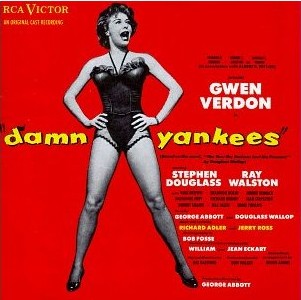
Damn Yankees is a 1955 musical comedy with a book by George Abbott and Douglass Wallop, music and lyrics by Richard Adler and Jerry Ross. The story is a modern retelling of the Faust legend set during the 1950s in Washington, D.C., during a time when the New York Yankees dominated Major League Baseball. It is based on Wallop's 1954 novel The Year the Yankees Lost the Pennant.

High Button Shoes is a 1947 musical with music by Jule Styne, lyrics by Sammy Cahn and book by George Abbott and Stephen Longstreet. It was based on the semi-autobiographical 1946 novel The Sisters Liked Them Handsome by Stephen Longstreet. The story concerns the comic entanglements of the Longstreet family with two con men in Atlantic City.

Wonderful Town is a 1953 musical with book written by Joseph A. Fields and Jerome Chodorov, lyrics by Betty Comden and Adolph Green, and music by Leonard Bernstein. The musical tells the story of two sisters who aspire to be a writer and actress respectively, seeking success from their basement apartment in New York City's Greenwich Village. It is based on Fields and Chodorov's 1940 play My Sister Eileen, which in turn originated from autobiographical short stories by Ruth McKenney first published in The New Yorker in the late 1930s and later published in book form as My Sister Eileen. Only the last two stories in McKenney's book were used, and they were heavily modified.
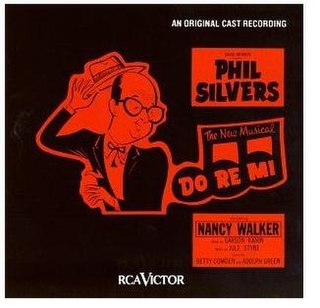
Do Re Mi is a musical with music by Jule Styne, lyrics by Betty Comden and Adolph Green, and a book by Garson Kanin, who also directed the original 1960 Broadway production. The plot centers on a minor-league con man who decides to go (somewhat) straight by moving into the legitimate business of juke boxes and music promotion. The musical was headlined by the comedy couple of Phil Silvers and Nancy Walker, both of whom were Tony nominated. Popular songs introduced included "Cry Like the Wind" and "Make Someone Happy".

Gay Divorce is a musical with music and lyrics by Cole Porter and book by Dwight Taylor, adapted by Kenneth Webb and Samuel Hoffenstein. It was Fred Astaire's last Broadway show and featured the hit song "Night and Day" in which Astaire danced with co-star Claire Luce.
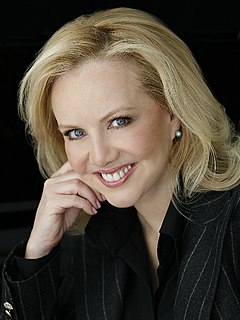
Susan P. Stroman is an American theatre director, choreographer, film director and performer. Her notable theater productions include The Producers, Crazy for You, Contact, and The Scottsboro Boys. She is a five-time Tony Award winner, four for Best Choreography and one as Best Director of a Musical for The Producers. In addition, she is a recipient of two Laurence Olivier Awards, five Drama Desk Awards, eight Outer Critics Circle Awards, two Lucille Lortel Awards, and the George Abbott Award for Lifetime Achievement in the American Theater. She is a 2014 inductee in the American Theater Hall of Fame in New York City.
Walter Bobbie is an American theatre director, choreographer, and occasional actor and dancer. Bobbie has directed both musicals and plays on Broadway and Off-Broadway, and was the Artistic Director of the New York City Center Encores! concert series. He directed the long-running revival of the musical Chicago.
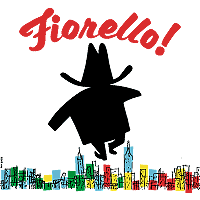
Fiorello! is a musical about New York City mayor Fiorello H. LaGuardia, a reform Republican, which debuted on Broadway in 1959, and tells the story of how LaGuardia took on the Tammany Hall political machine. The book is by Jerome Weidman and George Abbott, drawn substantially from the 1955 volume Life with Fiorello by Ernest Cuneo, with lyrics by Sheldon Harnick, and music by Jerry Bock. It won the three major theatre awards - Tony Award, the New York Drama Critics Circle award, and the Pulitzer Prize for Drama. It is one of only ten musicals to win the latter award.
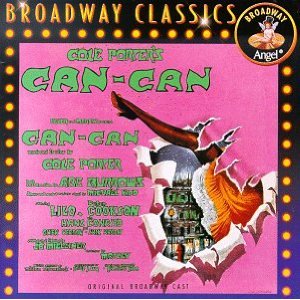
Can-Can is a musical with music and lyrics by Cole Porter, and a book by Abe Burrows. The story concerns the showgirls of the Montmartre dance halls during the 1890s.

Out of This World is a musical with music and lyrics by Cole Porter, and the book by Dwight Taylor and Reginald Lawrence. The show, an adaptation of Plautus' comedy Amphitryon, first opened on Broadway in 1950.

Zorba is a musical with a book by Joseph Stein, lyrics by Fred Ebb, and music by John Kander. Adapted from the 1946 novel Zorba the Greek by Nikos Kazantzakis and the subsequent 1964 film of the same name, it focuses on the friendship that evolves between Zorba and Nikos, a young American who has inherited an abandoned mine on Crete, and their romantic relationships with a local widow and a French woman, respectively.

Music in the Air is a musical written by Oscar Hammerstein II and Jerome Kern (music). It introduced songs such as "The Song Is You", "In Egern on the Tegern See" and "I've Told Ev'ry Little Star". The musical premiered on Broadway in 1932, and followed the team's success with the musical Show Boat from 1927.
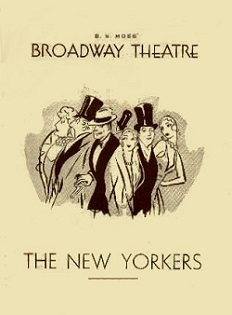
The New Yorkers is a musical written by Cole Porter and Herbert Fields (book). Star Jimmy Durante also wrote the words and music for the songs in which his character was featured.

The Band Wagon is a musical revue with book by George S. Kaufman and Howard Dietz, lyrics also by Dietz and music by Arthur Schwartz. It first played on Broadway in 1931, running for 260 performances. It introduced the song "Dancing in the Dark" and inspired two films.
Warren Carlyle is a British director and choreographer who was born in Norwich, Norfolk, England. He received Drama Desk Award nominations for Outstanding Choreography and Outstanding Director of a Musical for the 2009 revival of Finian's Rainbow.
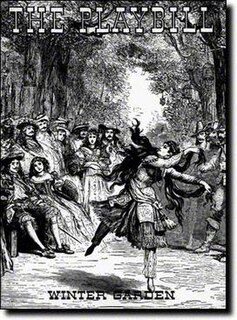
The Ziegfeld Follies of 1936 is a musical revue with lyrics by Ira Gershwin, music by Vernon Duke and sketches by Gershwin and David Freedman. The Ziegfeld Follies were a series of revues presented from 1907 through 1931, 1934, 1936, 1943, and 1957.

Lee Wilkof is an American actor and veteran of the Broadway stage. He originated the roles of Samuel Byck in Assassins and Seymour in Little Shop of Horrors, later earning a Tony Award nomination for the 2000 revival of Kiss Me, Kate.

J. Harold Murray was an American baritone singer and actor. For more than a decade, during the Roaring Twenties and the Depression Thirties, he contributed to the development of musical theater by bridging vaudeville, operetta and the modern American musical. The most popular American songs he introduced on Broadway included "Autumn in New York" ; "Let's Have Another Cup of Coffee" and "Soft Lights and Sweet Music" ; "Rio Rita", "The Kinkajou" and "The Rangers Song" ; and "Mandalay".
Randy Skinner is an American dancer, director and choreographer, primarily for the stage. He has been nominated four times for Tony Awards, three times for Drama Desk Awards, and four times for Outer Critics Circle Awards for choreography.
Jeffry Denman is an American actor, director, choreographer and author.
















